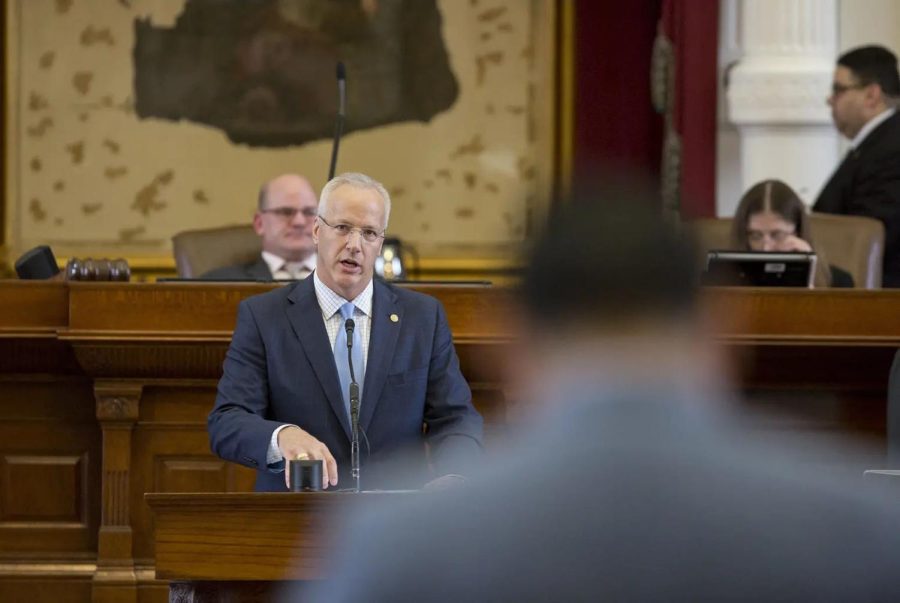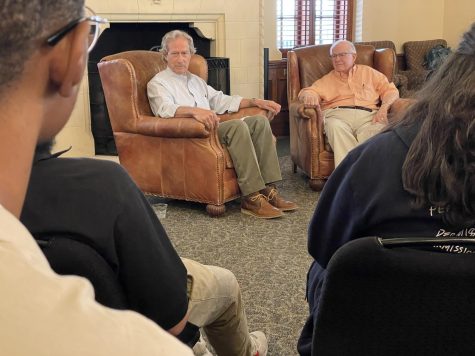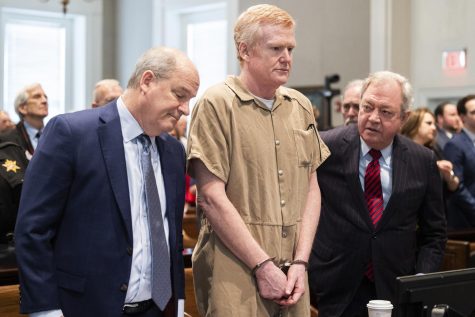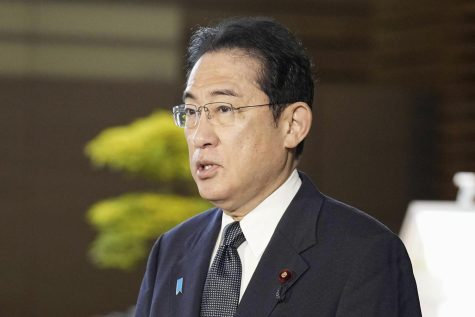Foster care privatization rolls out slowly
After Texas lawmakers overhauled the state’s foster care services in 2017, advocates say it’s unclear if the new model has helped
MARJORIE KAMYS COTERA / Texas Tribune
State Rep. James Frank, R-Wichita Falls, answers a question from Rep. Armando Walle, D-Houston, regarding Senate Bill 11 on May 18, 2017.
Desperate for a fix, Texas lawmakers in 2017 ordered an overhaul of foster care services, kicking most of the state’s responsibilities of monitoring abused and neglected children to contractors.
Under the new community-based care model, the Texas Department of Family and Protective Services divided the state into regions and must hire third-party contractors for each region. It’s then up to these third-party contractors to place foster care children in residential facilities or find foster parents.
But since 2017, the state’s rollout of community-based care has progressed at a snail’s pace. While it started to pick up steam in March when vendors signed on to act as the lead contractor in three new regions, it will take another six years before the responsibility of foster care placement is firmly in the vendors’ hands.
The model was designed to keep foster kids closer to their own hometowns. Supporters argued local groups knew the region better than a state agency headquartered in Austin, enabling them to place children in homes and connect them to services in the area.
But the rollout has been complicated, working to hire more contractors to take over what has always been a state task. Third-party vendors have entered and backed out of contracts, those that pushed through financial losses have publicly pressured the agency to be more flexible in its regulations, and agency caseworkers feel like they’ve been hung out to dry. Under the new model, state caseworkers are being asked to switch to nonprofit employers who cannot offer the same benefits, pay or stability.
Six years into the rollout, it’s unclear whether the model has helped the foster care system.
Still, lawmakers have continued to favor the community-based care model. This legislative session alone, the House and Senate have set aside at least $91.9 million.
“This decentralization to the community is, by many standards, struggling,” said state Sen. Lois Kolkhorst, R-Brenham, at an oversight committee meeting about the new model last year.
After the 2017 death of a 15-year-old girl staying at a Houston CPS office, momentum intensified around child welfare legislation. In the session’s final hours that year, lawmakers passed Senate Bill 11.
The eleventh-hour vote set into motion a complete overhaul of the state’s child welfare agency that would move the management of foster care child placements from DFPS to local vendors.
“We must leave the status quo behind,” state Rep. James Frank, a Wichita Falls Republican and the bill’s sponsor, said on the House floor at the time. Frank had the support of Gov. Greg Abbott, Lt. Gov. Dan Patrick and then-House Speaker Joe Straus.
Some child welfare advocates were wary of the legislation. They expressed pointed to privatization efforts in Florida, which failed to produce better outcomes for kids.
“There are very few organizations that can do this,” Scott McCown, then the director of the Children’s Rights Clinic at the UT-Austin School of Law, warned lawmakers during public testimony in 2017.
Since 2017, it’s been a slow-footed rollout. Today, only a third of Texans have contractors managing foster care services in their area. State officials estimate all regions will have a local contractor in 2029, more than a decade since the model was created.
“I don’t know what we got to do to get the attention of the personnel involved in these agencies to implement what we say we need to do,” state Sen. Charles Perry, R-Lubbock, said last year.
One thing that has helped was the creation of a new state Office of Community-Based Care Transition. Established by lawmakers in 2021, the office reports acts as a middleman between contractors and the rest of DFPS and reports directly to the governor.
DFPS officials insist they’re committed to community-based care. The transition does require some extra-contractual and financial expertise, DFPS Commissioner Stephanie Muth told lawmakers earlier this year.
“We’re in two worlds,” Muth said. “We have the legacy world, we have the CBC [community-based care] world. We know how to operate the legacy world — that’s our comfort zone. But as you look at moving to community-based care, it’s very different skill sets that we need as an agency.”
In March, when DFPS signed contracts in three new regions, Muth promised the expansion would be a “turning point” for community-based care.
Not enough funding
Community-based care was presented as a cost-neutral solution for the state, but it hasn’t played out that way for contractors. The cost of services has exceeded state payments, forcing contractors to look externally for funding.
Providence Services Corporation, the contractor for a large swath of West Texas, called it quits after one year. Despite successfully running several foster care service programs in other states, Providence was losing money in Texas. Mike Fidgeon, Providence’s CEO, cited unanticipated transportation costs to care for children in the expansive, rural region where the company was working.
In Fort Worth, the organization Our Community Our Kids had to come up with millions from its own funds to meet the costs of managing services. Saint Francis Ministries was also short millions of dollars early in their role as lead contractor for the Panhandle because staffing costs exceeded reimbursement rates.
To come up with a formula on what to pay contractors, the state relied on decades-old data, which they say doesn’t accurately reflect the cost and staff time needed to provide care. The agency is in the process of changing the financial infrastructure of foster care, which would mean contractors would see new rates.
Still, reimbursement rates have made providers a little gun-shy about jumping into this new model. When DFPS tried to roll out the model in the Midland area, no providers wanted to become the lead contractor.
The nonprofit One Accord for Kids formed to prepare the Midland area to adopt the community-based care model. In the end, One Accord did not raise its hand to serve as the lead contractor in part because the amount being paid by the state was “pathetic,” said Brandon Logan, the organization’s executive director.
“Community-based care will always be more expensive, because you’re adding a mid- management layer that doesn’t exist currently. And (for) that level of regional administration, there’s costs related to that,” Logan said.
Lack of flexibility
Providers at first complained that policies set out for DFPS contractors were inflexible.
“We were being asked to do things pretty much the way that they had been done,” Logan said. “My observation of community-based care, even to this point, is that the department is really just privatizing and franchising itself. The system is not being transformed.”
For example, Saint Francis Ministries, the contractor in the Panhandle, asked the state agency to waive its requirements for its caretakers. When the state cannot immediately find foster families or licensed facilities for children, they are first placed in an unlicensed facility or shelter that contracts with the state.
Per DFPS policies, temporary caregivers at these facilities need to be licensed and trained.
But Saint Francis requested DFPS allow only one caregiver to be licensed and trained so long as the second caregiver was not alone in a room with the child and had asked the agency for permission to do so.
At a hearing last August, Cristian Garcia, the chief advancement officer at Saint Francis Ministries, told lawmakers that he hadn’t received a written response from the agency one year after submitting that waiver request.
In Fort Worth, ACH Child and Family Services CEO Wayne Carson described an inefficient process to comply with new training requirements. Staff have had to often repeat training so it is marked as completed in DFPS’s system.
“There doesn’t even seem to be a conversation about … can we do it differently?” Carson said. “Is there a different way to get what needs to happen, as opposed to just, ‘Everybody has to start completing this form; everybody has to complete this training?’”
In response to the criticism, DFPS implemented a streamlined process for policy waivers. Most submitted since 2019 have been granted. Garcia said the agency has been more flexible with waiver requests since the hearing last summer.
“Both DFPS and the Office of Community-Based Care (OCBCT) took those [flexibility concerns] seriously and acted,” DFPS spokesperson Patrick Crimmins wrote in a statement to the Tribune this month. “We are being more flexible and approving those that involve state policy. Those rejected involve federal regulations we cannot waive.”
Pushing out caseworkers
Outsourcing the child case management of foster care has put the jobs of DFPS caseworkers in limbo, along with the benefits that come with working for the state, such as a pension.
State caseworkers are being asked to switch their employer from the state agency to the lead contractor, known as a “single source continuum contractor,” or SSCC, in their region. That’s a big switch that not all caseworkers are willing to make.
“You’d be hard-pressed to find somebody that’s looking forward to go work at a SSCC,” said Myko Gedutis, an organizer with the Texas State Employees Union. “It’s nerve-wracking, if you’ve invested in the state pension system, to walk away from that. Even though it’s not the best pension in the world, it’s a pension.”
Sabrina Bedford has worked at the state child welfare agency in San Antonio for 16 years. For Bedford, a state pension means a secure retirement. She finds privatization a misdirection of state efforts and feels that DFPS should instead prioritize properly funding and staffing state employees.
“Put a stop to the privatization of the Texas foster care system and instead stabilize and rebuild,” Bedford said.
“Abdicating accountability”
Questions persist about how the state will take accountability if problems emerge with a contractor.
San Antonio saw the worst-case scenario for the implementation of community-based care, when case management services were kicked to a nonprofit that housed foster kids in potentially dangerous conditions.
Family Tapestry had been in a contract with the state for more than two years when reports surfaced of physical abuse, neglectful supervision and medical neglect at its emergency shelter, Whataburger Center. The emergency shelter was also cited 239 times for not meeting state minimum standards between 2016 and 2020. Family Tapestry decided to cancel its contract with the state weeks after the state ordered kids at the Whataburger Center be moved to a different facility.
After the break with Family Tapestry, the state agency increased training for contractors earlier in the transition and offered other support to contractors.
Some are still worried that the privatization model allows the state to just swap out a contractor if there are problems, making the state less accountable.











